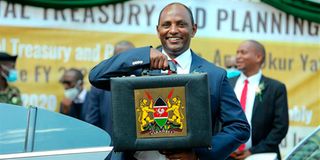Premium
What is a supplementary budget and why do we need one?

Treasury Cabinet Secretary Ukur Yatani.
What you need to know:
- The National Treasury receives requests for additional funding from ministries and other state organs.
- Treasury presents the budget to Parliament, which debates it and votes to either pass or reject it.
While many of us may be familiar with a budget because we make plans on how to use our own money, it may be difficult to understand the government budget and the processes involved.
The National Treasury is seeking the approval of the National Assembly for an extra Sh126 billion for this year’s budget. This additional budget is referred to as a supplementary budget.
What is a supplementary budget and why do we need one?
A supplementary budget is a request by state departments and agencies for additional funding in the course of a financial year.
It is meant to take care of expenditure that was not factored in during budget-making.
Mr Ken Gichinga, chief economist at Mentoria Economics, says the new expenditure could be as a response to an emergency situation such as floods, drought or an unforeseen situation such as the Covid-19 pandemic.
The budget could also be due to new developments that have come up and were not foreseen during budget making.
How does Treasury decide which departments need extra finances?
The National Treasury receives requests for additional funding from ministries and other state organs.
It can also decide to allocate funds to agencies that may be struggling to stay afloat.
This year, Treasury has allocated Sh26 billion to Kenya Airways for restructuring and Sh4.8 billion to the Kenya Wildlife Services and Kenya Airports Authority, while universities will receive a Sh8.58 billion boost through an additional allocation to the Higher Education Loans Board.
Treasury also allocates funds in response to emergencies and this year, Sh1.2 billion has been allocated to fight drought that is ravaging arid and semi-arid areas of the country.
Are all requests for money granted?
While state departments and agencies can request money, Treasury may decide to slash their budgets, or grant the departments what they ask for.
This year’s supplementary budget has seen some departments lose a huge chunk of what had been allocated to them.
One such area is marine transport whose allocation has been slashed by Sh15 billion.
National Treasury Cabinet Secretary Ukur Yatani said the money had been redirected to other key economic projects due to slow progress in its use.
The Agriculture ministry will also do without Sh1.29 billion after Treasury directed it to other areas deemed to be of higher priority, citing low absorption of the funds by the ministry.
How can we check whether the departments requesting money actually need it?
Mr Gichinga says while Treasury cannot immediately determine whether money being requested is actually needed, there are ways to check whether the money was spent accordingly.
“The Auditor General is the one in charge of checking whether funds allocated were utilised properly. Although this happens way later, after the money has been allocated and spent, there is still a way to check that the money is spent for the purpose it was intended for,” he says.
While the supplementary budget is largely supposed to be for emergencies and new developments, Mr Gichinga notes that some of the departments allocated money in this mini budget should have had that money allocated during the annual budget.
“The Independent Electoral and Boundaries Commission (IEBC) should not be having money allocated to them at this time of the year, yet we know every five years there is an election. They should have had enough money allocated to them in the main budget,” he added.
He notes that the main challenge in Kenya is that Treasury, while making the annual budget, tries to cut down so as to make the budget not look too big because that would mean more borrowing, which in turn means more debt for the country and that is why some of the expenditure is allocated in the supplementary budget.
Who approves the supplementary budget?
Treasury presents the budget to Parliament, which debates it and votes to either pass or reject it.
The various departments requesting money may also be summoned by Parliament to explain and defend the amounts they are requesting.
Parliament may also suggest areas of amendment on the supplementary budget before passing it.





